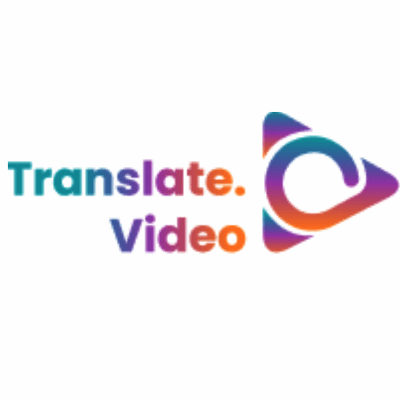What Is Video Translation Services?
Video Translation Services are expert language translation services dedicated to translating videos into many languages for global audiences. These firms use qualified translators who are fluent in the target language and have a thorough understanding of cultural subtleties and colloquialisms. One of the primary benefits of using video translation services is the potential to reach a larger audience.
Businesses that translate movies into several languages may successfully communicate their message to a wide range of potential customers, resulting in improved brand exposure and sales. Furthermore, video translations can boost a brand's legitimacy and reliability among international buyers.
Businesses who provide material in their native language demonstrate passion and respect for their target audience's culture and language, building a closer relationship with them. In addition to language translation, video translation services provide subtitling and closed captioning choices. This enables businesses to reach a broader audience, including people who are hearing impaired or want to watch videos without sound.
Another key part of video translation services is to ensure accuracy and quality. Professional translation firms have stringent quality control systems in place to ensure that the translated content is error-free and expresses the intended meaning accurately. This is critical for firms seeking to maintain a positive brand image while avoiding potential misinterpretations or misconceptions.
When contemplating video translation services, it is critical to select a reliable and competent agency that specialises in video translation. This involves having access to cutting-edge technology and resources for dealing with various video formats, ensuring the videos' confidentiality and security during the translation process, and providing short turnaround times.
What Are The Recent Trends In Video Translation Services?
In today's global marketplace, businesses are rapidly recognising the value of using video content to reach a varied audience. As a result, the demand for video translation services has increased, resulting in the introduction of new trends in the business.
In this buyer's guide, we'll look at the latest trends influencing the video translation services industry and how they might help you select the best service provider for your requirements.
1. Technology-Driven Solutions: As technology advanced, video translation services saw a dramatic revolution. Traditional translation procedures, in which human translators transcribed and translated videos manually, are no longer used. Today, video translation is more automated thanks to artificial intelligence (AI) and machine learning (ML) algorithms. This not only accelerates the process, but also increases accuracy and lowers expenses.
2. Multilingual Video Streaming: The proliferation of streaming platforms has enabled businesses to broadcast their videos globally. This has created a need for on-demand translation services, allowing viewers to choose the language in which they want to watch the movie. As a result, video translation services now provide multilingual streaming alternatives, making it easier for users to access material in their preferred language.
3. Customised Localisation: Localisation is the practice of modifying a film to fit a certain cultural and language environment. It is more than just translation; it also includes adjusting the content to the target audience's cultural subtleties and preferences. Recent trends in video translation services indicate a focus on customised localisation to ensure that videos resonate with the intended audience, resulting in increased engagement and ROI.
4. Video SEO Optimisation: As video content gains importance in digital marketing, it is critical to optimise it for search engines. This has resulted in an increase in video SEO optimisation services, in which videos are translated and transcribed with keywords and metadata to improve their discoverability on search engines. This might substantially help firms that want to reach a global audience with their videos.
5. Increasing The Use Of Remote Simultaneous Interpreting (RSI): RSI is a type of interpreting that enables many languages to be translated in real time during a live event or virtual meeting. With the proliferation of virtual events and webinars, RSI has grown more common. This trend has now spread to video translation services, which now offer RSI for videos to help businesses and organisations engage with worldwide audiences in real time.
Benefits Of Using Video Translation Services
Video translation services can help businesses and individuals reach a global audience. In today's interconnected world, videos have emerged as one of the most effective ways to convey a message and engage audiences. However, if your target audience speaks a different language, the effect of your video may be lost during translation. That's where video translation services come in, serving as a bridge between you and worldwide viewers.
Here are the main advantages of employing video translation services:
1. Reach A Larger Audience: Let's face it: the majority of the world's population does not speak English as their native language. Using video translation services allows you to efficiently communicate with non-English speaking consumers while also expanding your worldwide reach.
2. Maintain Accuracy And Quality: Translating a movie entails more than simply substituting words in one language with their equivalent in another. Consider cultural subtleties, accents, and idioms to ensure that the translated version accurately expresses the original video's message. Professional translation services use native-speaking translators who are familiar with the intricacies of the target language, ensuring accuracy and video quality.
3. Save Time And Effort: Translating a film in-house can be a time-consuming and difficult procedure. Hiring a competent video translation service allows you to save time and focus on other crucial parts of your business.
4. Increase Engagement And Conversion Rates: Research has shown that people are more inclined to interact with and share material in their local language. By translating your films, you make them more accessible and appealing to your intended audience, which can result in higher engagement and conversion rates.
5. Cost-Effective Solution: Outsourcing your video translation needs may appear to be an extra investment, but it can actually save you money in the long term. Professional video translation services offer the resources and knowledge to provide high-quality translations, saving you the cost of hiring and training your own translators.
6. Improve Brand Perception: When your audience sees that you have spent the time and effort to translate your films, it shows that you are committed to reaching out and engaging with them. This can significantly increase brand perception, allowing you to stand out as a global and inclusive organisation.
Important Factors To Consider While Purchasing Video Translation Services?
When it comes to acquiring video translation services, customers need keep several essential aspects in mind to ensure they are getting high-quality, accurate translations that match their unique requirements.
Here are some important factors for buyers to consider, ranging from linguistic capability to cost and reputation of the translation company:
1. Language Capabilities: The first and most crucial consideration is whether the video translation firm supports the languages you need. It is critical to ensure that they have native-speaking translators who are fluent in the language into which you need your video translated. This ensures that the translations are culturally suitable and correct.
2. Industry Experience: The translation company's industry experience is also a significant consideration. Depending on the subject matter of your video, you may need specialised knowledge and expertise. Look for a provider that has worked with videos in your specific industry to ensure accurate and high-quality translations.
3. Quality Assurance: You want to ensure that the translations you receive are of the highest standard. A professional translation company would have a stringent quality control process in place, such as having numerous translators work on the same project and doing extensive proofreading and editing to ensure correctness and consistency.
4. Turnaround Time: With video translation, time is of the essence, especially if there is a tight deadline. Before making a purchase, ensure that you discuss the turnaround time with the translation firm. Some may provide urgent services for an additional price, therefore it is critical to understand their capabilities and limitations.
5. Cost: Obviously, cost is an important consideration when purchasing any service. When it comes to video translation, seek estimates from several businesses and compare their pricing. However, remember that the lowest option is not necessarily the best. Before making a cost-based selection, consider other aspects such as translation quality.
6. Customer Reviews And Reputation: Check internet reviews and request references from past clients to get a sense of the translation company's reputation. A company that has a track record of offering high-quality, accurate translations as well as outstanding customer service is likely to be reliable.
7. Extra Services: Determine whether the translation company provides any extra services that would be useful to you, such as subtitling or voice-over services. By outsourcing all of your video translation needs to a single source, you may save both time and money.
What Are The Key Features To Look For In Video Translation Services?
When selecting a video translation service, you should check for a few essential elements to ensure that you get high-quality, accurate translations.
These features include the following:
1. Language Support: The most significant feature of any video translation service is the number of languages it supports. Make sure to choose a provider that provides translations in the languages you need, and ask if they have native translators for the language to assure accuracy.
2. Professional Translators: It is critical to select a video translation service that uses professional translators that are fluent in both the source and destination languages. A trained translator will comprehend the subtleties of each language and successfully express the intended message.
3. Technical Knowledge: Video translations necessitate a certain level of technical knowledge in order to accurately translate elements such as captions, subtitles, on-screen text, and voiceovers. To avoid problems, choose a provider that has experience dealing with technical issues of video translation.
4. Quality Assurance: A professional video translation firm will have a stringent quality control procedure in place. This includes proofreading and accuracy tests to ensure that the final translated video is error-free and high-quality.
5. Turnaround Time: If you have a tight deadline for your video translation job, you must find a firm that can meet it. Make sure to enquire about their turnaround time and any additional expenses for faster service.
6. Confidentiality: Video translation services must protect the privacy and security of your recordings and their information. Look for a provider that has safeguards in place to protect your video and critical data.
7. Cost: While cost should not be the sole deciding factor, it is critical to analyse the pricing of video translation services. Compare the rates and services of various suppliers to determine which one delivers the most value for your money.
Why Do Businesses Need Video Translation Services?
In today's interconnected world, firms are looking outside their local markets to reach a worldwide audience. Videos are one of the most efficient ways to communicate with a varied audience. Businesses may find it difficult to properly communicate their message to a foreign audience due to differences in languages and cultural nuances. Here's where video translation services come in.
Video translation services enable businesses to translate their video material into several languages, making it more accessible and understood to a larger audience. It is more than just adding subtitles; it is a comprehensive localisation process that considers cultural variations, tone, and context. Businesses can use video translation services to overcome language barriers and connect with a worldwide audience.
This creates new prospects for growth and expansion, as well as potentially increased income. It also helps organisations establish a strong international presence and gain credibility with global customers. Furthermore, video translation services can help improve a company's brand image. Businesses who offer their material in different languages can demonstrate their commitment to inclusion and meet the diverse needs of their audience.
This can improve consumer happiness and loyalty. With the advent of social media and video streaming platforms, businesses cannot afford to ignore the value of video translation services. It enables them to enter new markets and obtain a competitive advantage in today's global economy. From marketing and advertising to training and customer assistance, video translation services are critical for businesses looking to operate on a global scale.
How Much Time Is Required To Implement Video Translation Services?
The time required to develop video translation services varies according to a number of criteria. These include the length and intricacy of the video, the number of languages being translated, and the method employed by the translation service provider. On average, translating and localising a 5-minute video into a single language can take between 1 and 2 days.
This covers the time required for translation, proofreading, and quality assurance procedures. However, if the video is longer or has more sophisticated language needs, the time required will increase proportionately. Furthermore, if the movie is to be translated into multiple languages, the time necessary will rise. This is because each language may have unique cultural subtleties, necessitating independent translation and localisation processes.
Additionally, the sort of translation service provider you select can influence the time required for implementation. Automated translation systems may offer a faster response time, but their accuracy and quality may not be as consistent as human translation services. Human translation services, on the other hand, may take longer, but they provide a more accurate and culturally relevant translation.
Overall, the time required to execute video translation services might vary from a few hours and several days, depending on the parameters listed above. To receive an accurate estimate of the time required for your job, you must describe your precise needs and expectations to the translation service provider.
What Is The Level Of Customization Available In Video Translation Services?
When contemplating video translation services, it is critical to understand the level of customisation possible to ensure that the end result suits your specific requirements. Customisation refers to the capacity to adjust the translation to your target audience, style, and unique needs. The level of customisation offered by different service providers varies, so it is critical to select a firm that can meet your specific needs.
The first level of customisation is language-specificity. This means that the translation is completed in a language specific to your intended audience. For example, if your target audience speaks Spanish, the video should be translated into Spanish rather than a generic "Latin American Spanish" that may not be appropriate for all Spanish-speaking countries. The second type of customisation is cultural sensitivity.
A professional translation service will consider cultural nuances, phrases, and references that your target audience may not be aware with in addition to interpreting the words. This guarantees that your message is successfully communicated without cultural boundaries. Third, the level of customisation takes into account the style and tone of your original video.
This is critical for maintaining brand consistency and ensuring that the translated version appropriately represents your business's identity and message. A competent translation agency will collaborate with you to understand your brand and style guidelines, ensuring a consistent translation. Another major factor in customisation is the sort of video being translated. Different sorts of videos, such as marketing, instructional, and e-learning videos, may necessitate varying degrees of customisation.
For example, the translation in a marketing video may need to be more convincing and culturally sensitive, whereas in an educational film, the emphasis may be on accuracy and clarity. Some video translation services also provide extra customisation choices, such as subtitles, voiceovers, and on-screen text overlays. These can improve the viewing experience for your audience, making your video more engaging and accessible.
It is critical to discuss your exact customisation requirements to the translation service provider before beginning the process. This will help them comprehend your specifications and guarantee that the finished product fulfils your expectations.
Which Industries Can Benefit The Most From Video Translation Services?
With the rapid rise of the internet and globalisation, video content has become a vital component of organisations across all industries. However, not all viewers may understand the video's original language, which limits its reach and efficacy. Video translation services can be especially useful in this situation. Video translation services involve transforming a video's audio and written content into another language, making it more accessible to a larger audience. These services cater to a variety of industries, with some benefiting more than others.
Let us look at the industries that can gain the most from video translation services.
1. E-learning And Education: Schools, universities, and online courses can all benefit immensely from video translation services. With the globalisation of education and an increase in the number of international students, video translation can help non-native speakers access and engage with instructional videos and course materials.
2. Marketing And Advertising: In today's global economy, firms must reach out to a wide range of customers in order to grow. Video translation services may help businesses create localised advertising and promotional videos, allowing them to better connect with their target audience and raise brand awareness.
3. Entertainment And Media: Video material plays an important role in the entertainment business, which includes movies, television shows, and internet streaming services. By translating their information into other languages, they may reach a larger audience and boost their revenue.
4. Healthcare: Video translation services are critical in providing medical information and instructions to patients who do not speak the same language as their healthcare professional. It promotes effective communication, increases patient satisfaction, and raises the standard of care.
5. Government And Legal: Video translation services serve both government organisations and legal entities. They can employ translated movies for public announcements, judicial procedures, and immigration services, among other things, to ensure that their messages are accurately delivered to non-English speakers.
6. Travel & Tourism: Video translation services are essential in the travel and tourism business, offering multilingual content for advertising videos, trip guides, and tourist information. This helps to attract a varied spectrum of tourists, thereby strengthening the economy.
Conclusion
To summarise, video translation services are a beneficial alternative for businesses and people wishing to broaden their reach and interact with a global audience. These services combine skilled translators and cutting-edge technology to deliver accurate and high-quality translations of video content in a variety of languages. When selecting video translation services, you should evaluate your individual objectives and goals, as well as the translation company's skill and experience.
Look for firms that provide a diverse selection of languages and specialised translations for various businesses and subjects. Enquire about the company's quality control processes as well as its usage of secure technology to handle sensitive content. It is also recommended that you obtain sample translations and reviews from past clients to get a better idea of the quality of their work.
Consider the overall cost and turnaround time for translation services, as well as any other features like subtitling, voiceovers, and captioning that may be useful for your video content. Investing in competent video translation services can help you expand your global footprint and communicate with international audiences. With thorough research and deliberation, you may choose a dependable and proficient business that suits your specific requirements and assists you in achieving your goals efficiently.




















